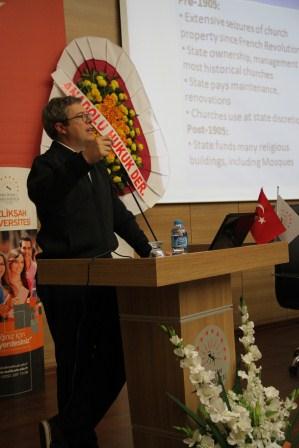Professor Scharffs Participates in Constitutional Law Congresses in Turkey

BYU Law School Professor and Center Associate Director Brett G. Scharffs presented papers comparing French and U.S. approaches to separation of religion and the state at two international conferences in Turkey in October 2011.
The first conference, held in Istanbul on October 7-8, 2011, an International Congress on Constitutional Law, “Deliberative / Pluralistic Constitution,” was sponsored by the Boğaziçi Lawyers Association, the bar association of Istanbul. The purpose of the Congress was to create a forum for discussion and debate about the primary issues involved in the proposed new constitution of Turkey. Professor Scharffs presented the same paper at a second conference, Turkey’s New Constitution, sponsored by and held at Melikşah University in Kayseri in central Turkey on October 10, 2011.
Professor Scharffs’ paper was entitled, “France and the United States: Two Models and Mythologies of Separation of Religion and the State (Neither of Which Involves Separation).” In the paper, Scharffs contrasted French laïcité with American Free Exercise and Establishment Clause jurisprudence, and argued that the French approach favors a robust “secularism,” whereas the U.S. approach adopts a framework of neutrality and pluralism that Scharffs’ described as “secularity.” The paper was an elaboration of ideas Professor Scharffs presented at an earlier International Congress on Constitutional Law in Istanbul in May, 2011.
In his paper, Scharffs’ compared French and American legal approaches to state management of religious affairs, funding of churches, the state’s role in recommending and selecting clergy, religion in public schools, and state funding of religious schools. Even though French laïcité is often viewed both in the U.S. and France as a particularly robust form of separation of church and state, Scharffs’ argued that in each of these areas there is greater state involvement in religious affairs in France than there is in the United States. Professor Scharffs concluded that there is more than one model for what it means to be a secular state, and that separation of church and state does not necessarily entail either a high degree of hostility towards or a high degree of control of religion by the state.
Professor Scharffs’ paper from the May 2011 International Congress, “Secularity or Secularism: Two Competing Visions for the Relationship between Religion and the State in the New Constitution of Turkey,” will be published in Turkish in December, 2011 in a collection of papers from the May 2011 International Congress. His paper contrasting U.S. and French Separation of Religion and the State will be published in Turkish in early 2012 in another book devoted to the proceedings of the October conferences. He was also interviewed and quoted in several national and regional newspapers and television news programs.